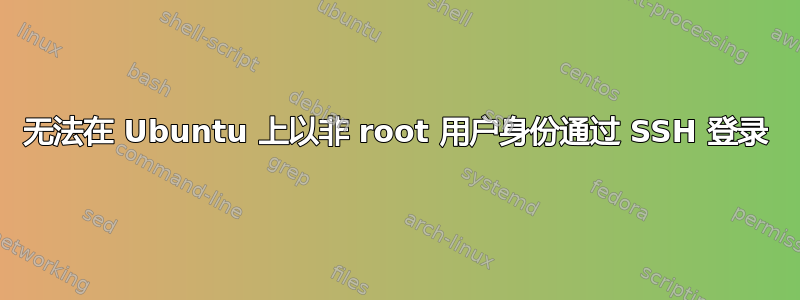
我在 Ubuntu 上使用 PuTTY 生成 SSH 密钥并连接到 droplet。我可以以 root 身份通过 SSH 登录。但不能以非 root 用户身份登录。这是我以非 root 用户身份通过 SSH 登录的操作:
我手动将公钥复制粘贴到非root用户下的文件中执行以下命令获取权限:
chmod 700 .ssh
chmod 600 .ssh/authorized_keys
service ssh restart
这是我尝试以非 root 身份 SSH 登录时遇到的错误:
Using username "lin-yuan".
Server refused our key
[email protected]'s password:
以下是我尝试调试的内容:
1.我尝试lin-yuan@UF:~$ sshd -t并得到这个:
Could not load host key: /etc/ssh/ssh_host_rsa_key
Could not load host key: /etc/ssh/ssh_host_dsa_key
Could not load host key: /etc/ssh/ssh_host_ecdsa_key
Could not load host key: /etc/ssh/ssh_host_ed25519_key
2.然后我尝试lin-yuan@UF:~$ sudo /usr/sbin/sshd -d并得到这个:
debug1: sshd version OpenSSH_7.2, OpenSSL 1.0.2g 1 Mar 2016
debug1: private host key #0: ssh-rsa SHA256:+LJlY5iA1DGgr8cGZ2NOtZPT9ATq0gHoQ5YZwFq0TJE
debug1: private host key #1: ssh-dss SHA256:V0ZtT2SCbigpnhFaVRMjmXvo+4JtPUBRnh96L14Aue4
debug1: private host key #2: ecdsa-sha2-nistp256 SHA256:JoKckvTAm13WGE+3KWxROZc9C0SVf40Gn2cxHP6qDeU
debug1: private host key #3: ssh-ed25519 SHA256:lxGynCJlUXTjXsq2jeaVrB7YfiPPpRgcrQlyWPwO7Kc
debug1: rexec_argv[0]='/usr/sbin/sshd'
debug1: rexec_argv[1]='-d'
debug1: Set /proc/self/oom_score_adj from 0 to -1000
debug1: Bind to port 22 on 0.0.0.0.
Bind to port 22 on 0.0.0.0 failed: Address already in use.
debug1: Bind to port 22 on ::.
Bind to port 22 on :: failed: Address already in use.
Cannot bind any address.
但我仍然不知道哪里可能出了问题,你能帮助我吗?我附上了我的 /etc/ssh/sshd_config 的内容,如下所示,以防万一有一些设置需要更改。
# Package generated configuration file
# See the sshd_config(5) manpage for details
# What ports, IPs and protocols we listen for
Port 22
# Use these options to restrict which interfaces/protocols sshd will bind to
#ListenAddress ::
#ListenAddress 0.0.0.0
Protocol 2
# HostKeys for protocol version 2
HostKey /etc/ssh/ssh_host_rsa_key
HostKey /etc/ssh/ssh_host_dsa_key
HostKey /etc/ssh/ssh_host_ecdsa_key
HostKey /etc/ssh/ssh_host_ed25519_key
#Privilege Separation is turned on for security
UsePrivilegeSeparation yes
# Lifetime and size of ephemeral version 1 server key
KeyRegenerationInterval 3600
ServerKeyBits 1024
# Logging
SyslogFacility AUTH
LogLevel INFO
# Authentication:
LoginGraceTime 120
PermitRootLogin yes
StrictModes yes
RSAAuthentication yes
PubkeyAuthentication yes
#AuthorizedKeysFile %h/.ssh/authorized_keys
# Don't read the user's ~/.rhosts and ~/.shosts files
IgnoreRhosts yes
# For this to work you will also need host keys in /etc/ssh_known_hosts
RhostsRSAAuthentication no
# similar for protocol version 2
HostbasedAuthentication no
# Uncomment if you don't trust ~/.ssh/known_hosts for RhostsRSAAuthentication
#IgnoreUserKnownHosts yes
# To enable empty passwords, change to yes (NOT RECOMMENDED)
PermitEmptyPasswords no
# Change to yes to enable challenge-response passwords (beware issues with
# some PAM modules and threads)
ChallengeResponseAuthentication no
# Change to no to disable tunnelled clear text passwords
PasswordAuthentication yes
# Kerberos options
#KerberosAuthentication no
#KerberosGetAFSToken no
#KerberosOrLocalPasswd yes
#KerberosTicketCleanup yes
# GSSAPI options
#GSSAPIAuthentication no
#GSSAPICleanupCredentials yes
X11Forwarding yes
X11DisplayOffset 10
PrintMotd no
PrintLastLog yes
TCPKeepAlive yes
#UseLogin no
#MaxStartups 10:30:60
#Banner /etc/issue.net
# Allow client to pass locale environment variables
AcceptEnv LANG LC_*
Subsystem sftp /usr/lib/openssh/sftp-server
# Set this to 'yes' to enable PAM authentication, account processing,
# and session processing. If this is enabled, PAM authentication will
# be allowed through the ChallengeResponseAuthentication and
# PasswordAuthentication. Depending on your PAM configuration,
# PAM authentication via ChallengeResponseAuthentication may bypass
# the setting of "PermitRootLogin yes
# If you just want the PAM account and session checks to run without
# PAM authentication, then enable this but set PasswordAuthentication
# and ChallengeResponseAuthentication to 'no'.
UsePAM yes


